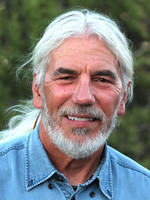
At one time, the American Great Plains functioned as a North American version of the African Serengeti: a place brimming with wildlife, an intricate ecosystem of apex predators and large herds of bison.
Author Dan Flores will talk about this time period and how, in one of the greatest destructions of wildlife in world history, humans devastated the American Serengeti in the 19th and 20th centuries. Flores delves into the remaining possibilities to restore at least some places on the Great Plains to their former glory as world-class wildlife reserves.
The free public lecture is at 3:30 p.m. Sept. 14 at the Center for Great Plains Studies, 1155 Q St. Flores' book will be available for purchase and signing by the author after the event. The lecture will also be available via Facebook Live on the center's Facebook page here.
Before the lecture, Flores will receive the center's 2017 Stubbendieck Great Plains Distinguished Book Prize for "American Serengeti: The Last Big Animals of the Great Plains" (University Press of Kansas).
"Flores' work, both his wonderful 'American Serengeti' and his lifetime of scientific study, lyrical writing and impactful advocacy, make him an excellent choice for the Stubbendieck Prize,” said center director Richard Edwards.
Flores is a writer and historian who specializes in environmental and cultural history of the American West. Before his retirement, Flores held the A.B. Hammond Chair in Western History at the University of Montana in Missoula. He is also the author of "Coyote America," winner of the Sigurd F. Olson Nature Writing Award.
The talk is part of the Paul A. Olson Great Plains seminars, a series of lectures on various Great Plains topics. For more information, click here.
Nebraska Today
More details at: http://www.unl.edu/plains/